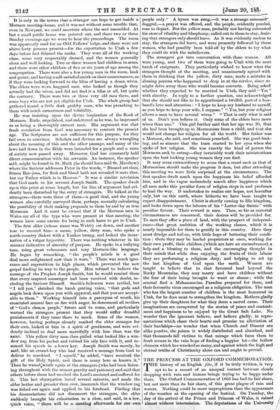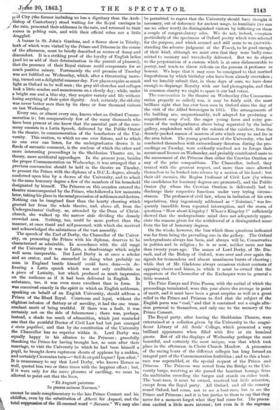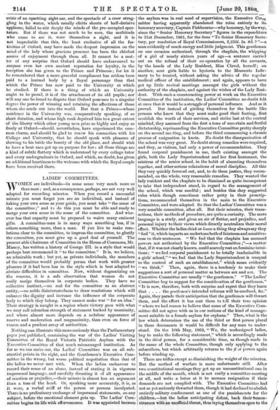THE PRINCESS AT THE OXFORD COMMEMORATION.
THE history of an English fête, if it be truly written, is very apt to be a record of an unequal contest between clouds dropping with rain and human beings trying to be happy under them. The Oxford Commemoration of 1863 has had its fair share, but not more than its fair share, of this great plague of rain and waters. Nothing could be more unpropitious than the appearance of the weather at the opening of the festival. On Tuesday, the day of the arrival of the Prince and Princess of Wales, it rained almost without intermission. The deputations of the University Ala City (the former including no less a dignitary than the Arch- ishop of Canterbury) stood waiting for the Royal carriages in / the rain, presented their addresses in the rain, and returned to their
" rooms in pelting rain, and with their official robes not a little draggled.
A bazaar in St. John's Gardens, and a flower show in Trinity, both of which were visited by the Prince and Princess in the course of the afternoon, must be briefly described as scenes of damp and discomfort. It is a striking proof of the loyalty of English ladies (and let us add of their determination in the pursuit of pleasure), that the presence of their Royal visitors could compensate for so much positive misery. Fortunately the evil promise of Tuesday was not fulfilled on Wednesday, which, after a threatening morn- ing, turned out a delightful summer day. Few places require so much light as Oxford to be well seen ; the gray old churches and colleges look a little sombre and monotonous on a cloudy day; while, under a bright sun and a blue sky, they acquire variety and life without losing anything of their quiet dignity. And, certainly, the old city was never better seen than by its three or four thousand visitors on last Wednesday.
Every one, or almost every one, known what an Oxford Comme- moration is ; bat comparatively few of the many thousands who have been present at one know that the essential part of the cere- mony consists in a Latin Speech, delivered by the Public Orator in the theatre, in commemoration of the benefactors of the Uni- versity. This oration, to which no one ever listens, and to which no one ever can listen, for the undergraduates drown it in floods of sarcastic comment, is the nucleus of which the other and more interesting proceedings in the Sheldonia,n Theatre are, in theory, mere accidental appendages. In the present year, besides the proper Commemoration on Wednesday, it was arranged that a previous convocation should be held in the theatre on Tuesday, to present the Prince with the diploma of a D.C.L. degree, already conferred upon him by a decree of the University, and to admit to the same honorary degree a few of the members of his household designated by himself. The Princess on this occasion entered the theatre unaccompanied by the Prince, who followed a few moments later, taking his place in the usualprocession of noblemenanddoctors. Nothing can be imagined finer than the hearty cheering which greeted her from the whole theatre, and, above all, from the Undergraduates' Gallery, as, attended by the Dean of Chest- church, she walked up the narrow aisle dividing the densely crowded area. Nothing, too, could be more perfect than the manner, at once timid and self-possessed, with which she received and acknowledged the salutations of the vast assembly.
The speech of the Earl of Derby, the Chancellor of the Univer- sity, on presenting the Prince with his diploma, deserves to be characterized as admirable. In accordance with the old usage of the University it was in Latin, a disadvantage which might well seem insuperable. But Lord Derby is at once a scholar and an orator, and he succeeded in doing what probably no man in England beside himself could have done —in de- livering a Latin speech which was not only creditable as a piece of Latinity, but which produced as much impression on the audience as if it had been delivered in English. In substance, too, it was even more excellent than in form. It was conceived exactly in the spirit in which an English nobleman, speaking on behalf of an English University, should address a Prince of the Blood Royal. Courteous and loyal, without the slightest infusion of flattery or of servility, it had the one trans- cendant merit of being truthful. If there was a fault, it was certainly not on the side of fulsomeness ; there was, perhaps, instead, a shade too much of admonition, which just reminded one that the youthful Doctor of Civil Law had but just emerged statu pupillari, and that by the constitution of the University the Chancellor has no superior within it. Lord Derby was equally happy in his allusion to the Princess ; gracefully thanking the Prince for having brought her, so soon after their marriage, to visit the University in which he had been himself a pupil, he brought down rapturous shouts of applause by a sudden, and certainly Ciceronia.n turn—" Sod de eaquid loquar? Ipsa adest." It is unnecessary to say that Lord Derby, who knows Horace so well quoted him two or three times with the happiest effect ; but, if it were only for the mere pleasure of cavilling, we must be allowed to point out that the lines,
"Et A ugusti paternus In pueros animus Nerones,"
cannot be made complimentary to the late Prince Consort and his childien, even by the substitution of Alberti for Augusti, and the total suppression of the ill-omened word ".Nerones." We may also
be permitted to regret that the University should have thought it necessary, out of deference for ancient usage, to humiliate (we can use no other word) its distinguished visitors by inflicting on them a couple of congratulatory odes. We do not, indeed, complain particularly of the specimens of Oxford poetry which were selected
for the purpose, and which seemed and still seem to us (notwith- standing the adverse judgment of the Times), to be good enough of their kind, although we must own that they were badly com- mitted to memory and wretchedly delivered. But we do object to the perpetuation of a custom which is at once dishonourable to
poetry, and tends to throw ridicule on the persons it professes to honour. We hope that it may soon be consigned to that merited forgetfulness by which birthday odes have been already overtaken ; and we humbly submit that, in these days of ours, we have done enough to disparage Royalty with our bad photographs, and that in common charity we ought to spare it our bad verses.
The convocation in the theatre on Wednesday (the Commemo- ration properly so called) was, it may be fairly said, the most brilliant sight that has ever been seen in Oxford since the day of the visit of the Allied Sovereigns in 1815. The arrangements of the building are, unquestionably, well adapted for producing a magnificent coup crag, the eager young faces and noisy ges- tures of the undergraduates above being separated by the ladies' gallery, resplendent with all the colours of the rainbow, from the densely-packed masses of masters of arts which sway to and fro in the area below. The young gentlemen of the University, who had conducted themselves with extraordinary decorum during the pro- ceedings on Tuesday, were evidently resolved not to forego their accustomed licence on Wednesday, and probably contributed more to the amusement of the Princess than either the Crewian Oration or any of the prize compositions. The Chancellor, indeed, they treated with the greatest respect, and more than once allowed themselves to be hushed into silence by a motion of his hand ; but their old enemies, the Regius Professor of Civil Law (by whom the candidates for honorary degrees are presented), and the Public Orator (by whom the Crewian Oration is delivered) had to discharge their respective functions under very trying circum- stances. The professor of civil law, whom in imitation of his own superlatives, they ingeniously addressed as " Noisaime," was fre- quently inaudible from repeated interruption, and the storm of questions "How about Kingsley ? Where's Kingsley ?" sufficiently showed that the undergraduate mind does not adequately appre- ciate the reasons given for the withdrawal of a distinguished name from the list of honorary degrees.
On the whole, however, the bias which these questions indicated was far from being the prevailing one in the gallery. The Oxford undergraduate always has been, and always will be, Conservative in politics and in religion ; he is so now, neither more nor less than twenty years ago. The names of Lord Derby, of Mr. Dis- raeli, and of the Bishop of Oxford, were over and over again the signals for tremendous and almost unanimous bursts of cheering ; while that of Mr. Gladstone always occasions violent contests of opposing cheers and hisses, in which it must be owned that the supporters of the Chancellor of the Exchequer were in general a little worsted.
The Prize Essays and Prize Poems, with the recital of which the proceedings terminated, were this year above the average in point of merit, and it must have been a great surprise as well as a great relief to the Prince and Princess to find that the subject of the English poem was "coal," and that it contained not a single allu- sion personal to themselves, and only one to the memory of the Prince Consort.
The Royal party, after leaving the Sheldonian Theatre, were entertained at a collation given by the University in the magni- ficent Library of All Souls' College, which presented a very brilliant appearance when filled with five or six hundred guests. But of all the displays of Wednesday perhaps the most beautiful, and certainly the most unique, was that which took place in the afternoon in Christ Church Meadow. A procession of the racing boats of the different colleges has long formed an integral part of the Commemoration festivities ; and to this a boat- race was superadded, at the special request of the Prince and Princess. The Princess was rowed from the Bridge to the Uni- versity barge, receiving as she passed the heartiest homage from the multitudes crowding the barges and stands on either bank. The boat-race, it must be owned, received but little attention, except from the Royal party. All Oxford, and all the country round Oxford, had come, not to see a boat-race, but to see the Prince and Princess ; and it is but justice to them to say that they never for a moment forgot what they had come for. The proces- sion excited a little more interest; but even in it the supreme
crisis of an upsetting eight oar, and the spectacle of a crew strug- gling in the water, which usually elicits shouts of half-derisive applause, failed to stir deeply the minds of the pre-occupied spec- tators. But if there was not much to be seen, the multitude who came to see it, were themselves a sight, and it is not improbable that this, the least exclusive of all the fes- tivities of Oxford, may have made the deepest impression on the mind of the lady whose gracious presence has been the chiefest source of enjoyment through them all. It cannot be a mat- ter of any surprise that Oxford should have endeavoured to surpass even her own ancient reputation for loyalty, in the reception she has given to the Prince and Princess ; for let it be remembered that a more graceful compliment has seldom been paid to a learned body by a Royal personage than that which the Prince has now paid to the University at which he studied. If there is a thing of which an University ought to be proud, it is of the attachment of its old pupils ; nor will any one be found to dispute that Oxford possesses to a singular degree the power of winning and retaining the affections of those whom she sends out into the world. But that a Prince—whose residence in the University was, comparatively speaking, of so short duration, and whose high rank deprived him to a great extent of the liberty which other young men prize so highly and enjoy so freely at Oxford—should, nevertheless, have experienced the com- mon charm, and should be glad to renew his connection with his College and University, that he should speak with pleasure of showing to his bride the beauty of the old place, and should wish to have a boat race got up on purpose for her ; all these things are a kind of subtle flattery which is understood by every college tutor and every undergraduate in Oxford, and which, no doubt, has given an additional heartiness to the welcome with which the Royal couple have been received there.
































 Previous page
Previous page